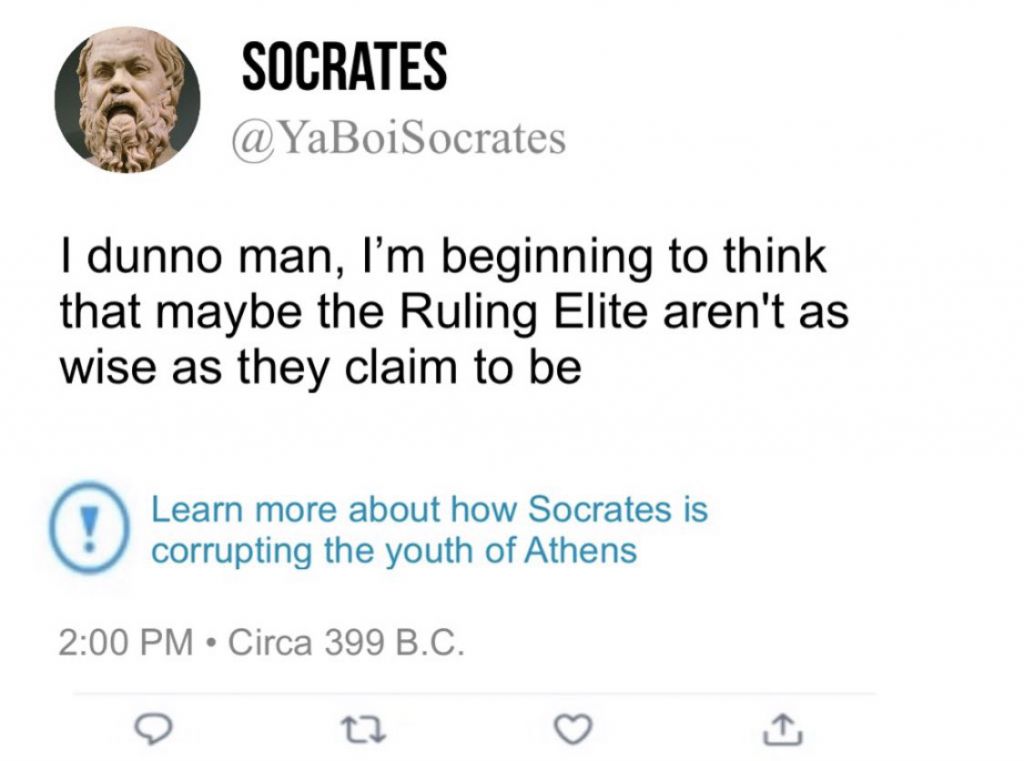Part of a series on ways to survive this dystopian nightmare
Socrates famously claims “the unexamined life is not worth living” during his trial in Plato’s Apology. Is this correct? Do humans need to examine everything in order to live well? Yes, and developments in philosophy since then demonstrates why this is the case.
Habermas nicely summarizes the progression of human belief and thought in Themes in Postmetaphysical Thinking, pointing out that modern empirical science operates through rational procedures of examining the world and its contents. Specifically, this way of thinking supplanted metaphysical and religious beliefs, resulting in a turning away from faith and the values identified by spiritual examination (Habermas, ‘Themes in Postmetaphysical Thinking’ 34–35). Although this development led to an improved understanding of the sciences, resulting in a growth in technology and mastery over the physical world, we introduced a conceptual void that cannot be filled by the same means or thought-processes that brought about improvements in our standard of living (Habermas, An Awareness of What Is Missing 19).
Luckily, existential philosophers like Kierkegaard and Camus show us how we can begin to reintroduce meaning within our lives, essentially by turning inward to examine one’s own perspective of the world. Through this process, one becomes better able to achieve an Aristotelian self-actualization which is not unlike Nietzsche’s ‘child’, as the individual is now secure within itself as a human, thus enabling the ability to create something new. The notion that happiness emerges from these processes is explicitly articulated in Victor Frankl’s Man’s Search for Meaning as he shows us a way out of even the darkest caverns of life by reminding us that as subjects, we have the capacity to reframe our attitudes toward our perceptions. Though the responsibility we have for our actions and beliefs may make us feel nauseous (Sartre’s Nausea), by reflecting on our experiences, we can begin to understand and accept elements of our world in their multitude of forms. Human consciousness involves a capacity to reflect on phenomenal experiences, and by engaging in this self-reflection, one becomes better aware of precisely what gives their life meaning and how best to organize their conduct. This includes the participation in practices and communities to create cultural products and ways of contributing to society in various ways. Most importantly, these contributions may not be measurable in dollars or hours, much to the chagrin of those who are interested in reinforcing the values held dearly by the mindset adopted by industrialized societies.
The unexamined life is not worth living because one risks falling into a whirlpool of autopilot and materialism, and therefore a lack of meaning. Moreover, while meanings provided by others may seem to fit our own perspectives at times, it is the passive, unreflective application that renders one feeling empty inside. This has the capacity to leading to depression as one feels disconnected from and ineffectual to both themselves and others. Unfortunately, certain beliefs we hold as a result of this modern, scientific society and culture fosters unexamined living. You, as a human, however, have the capacity to turn away from blind faith into a relationship with yourself that allows you to both expand your knowledge and produce works or actions that are beneficial and purposeful.

Works Cited
Aristotle. Aristotle’s Nicomachean Ethics. Translated by Robert C. Bartlett and Susan D. Collins, University of Chicago Press, 2011.
Frankl, Viktor E. Man’s Search for Meaning. Simon and Schuster, 1985.
Habermas, Jürgen. An Awareness of What Is Missing: Faith and Reason in a Post-Secular Age. Polity Press, 2010.
—. ‘Themes in Postmetaphysical Thinking’. Postmetaphysical Thinking: Philosophical Essays, MIT Press, 1994, pp. 28–53. Ares.
Nietzsche, Friedrich Wilhelm, Mildred Mary Bozman, and A. Tille. Thus Spake Zarathustra. Dent, 1958.
Plato. Apology. Translated by Benjamin Jowett, Project Gutenberg, 1999, https://www.gutenberg.org/files/1656/1656-h/1656-h.htm.
Sartre, Jean-Paul. Nausea. Penguin UK, 2021.